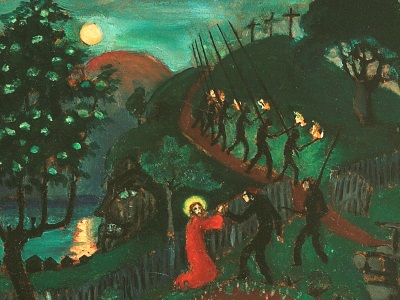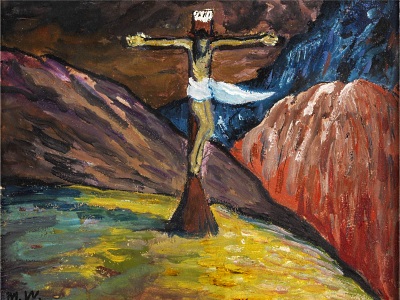Christian circles have often been attacked on account of their call to repentance. They are told that the unceasing accusation of the conscience paralyzes initiative, takes away freedom, and destroys personality. Certainly one would have to come to this conclusion if one were to experience only the consciousness of sin by itself. But those who proclaim Christ cannot separate repentance from faith. The message of the cross is inseparably one with the proclamation of the Risen One.
Luther called for daily remorse and repentance because he experienced again and again the unconditional certainty of possessing the gift of salvation. He knew that no one could accuse or condemn God’s elect, and he knew himself to be justified by God himself. He had experienced the presence of the Christ who intercedes for us with the very powers of his resurrected life.
One of the things that cannot easily be explained is that for a Christian, the deepest recognition of sin and absolute freedom from all condemnation must become completely one. The source of inner freedom and faith lies in God and Christ, while the murky depths of remorse and repentance are found only in ourselves.
It is the soul’s instinct of self-preservation which holds us back from complete honesty about our own moral condition. Without the strength of the gospel, unrestrained insight into our own helplessness and depravity would lead us to despair, for it is just when we attempt to apply the strictest self-discipline and the firmest moral code that we are faced with the absolute impossibility of justifying ourselves in the eyes of God. The gospel wants the truth about our condition to come completely out into the open. At the same time, it offers us the possibility of a clear and joyful conscience – a merciful God in the midst of deepest self-recognition. What we are unable to do by our own efforts, God has done: He sent us his Son.
Faith in this fact cannot be shaken by anything. Even though all people speak against us, even though they accuse and condemn us, we believers in God and in Christ still cannot be discouraged. However hard the times, however low the ebb of moral and religious power, this one fact remains: God gave his own Son for us. And even if we cannot find other people who in their actual lives reflect God’s nature, still Jesus remains – the redemption for every person.
This historical fact must become the spiritual experience of the present. It means that God, in giving us Jesus, gave us everything. Perfect love became flesh, and this means his love will become life and reality everywhere. Once we grasp this we can no longer despair of God’s love, or question his intervention on our behalf. However, we misuse and belittle the certainty of this love if we accept it without at the same time destroying our own vanity and self-will. The collapse of national pride, self-accusation and guilt, the disintegration of cultural values in state and church, and the repeated evidence that it is impossible to produce with purely human powers the conditions of peace and justice we long for: all these experiences convince us that we need grace.
Grace is a sovereign gift; we can do nothing to acquire it. That inner state in which it seems everything is breaking down is the preparation we need to receive Christ. Only when everyone accuses us – only when we condemn ourselves in the sharpest way – are we in a condition of inner readiness for the message of salvation.
The invincible power of the first Christians sprang from the fact that they believed in the presence of that same Christ who had ascended to the Father. We, too, can believe in the powers of Jesus’ death and the strength of his resurrection only when we experience the immediate presence of Christ.
The first Christians lived by the promise of the Risen One: “I am with you always, even to the end of the world” (Matt. 28:20). All their meetings were permeated by this certain faith; they believed in and experienced his personal presence so strongly that they lived entirely under his influence. The awareness of Jesus’ presence was the secret of their strength. They experienced the Risen One as the Spirit present among them. Through him they were freed from all bondage, and through him they were freed to use all their human gifts and powers.
For us, too, faith in the Risen One and in his Spirit must lead to a new attitude in everyday life. And faith unlocks the spiritual powers at work in Christ. The Lord is Spirit, and he molds our lives according to his image (2 Cor. 3:17). How we actually live – how we put love into action – depends not on moral conviction but on faith. Everything depends on whether we know the resurrected Christ and whether we have his Spirit. It does not help us to long for Christ to appear from heaven. The only way to truly experience his presence is to know and feel in our hearts that the Christ, who was raised from the dead by God, has come to us as the living word.
Adapted from Johann Christoph Arnold, Eberhard Arnold, Modern Spiritual Masters (Rifton, NY: Plough, 2011).
The original document can be read in full in our digital archive: "The Spirit of the Risen One" (April, 1919).


